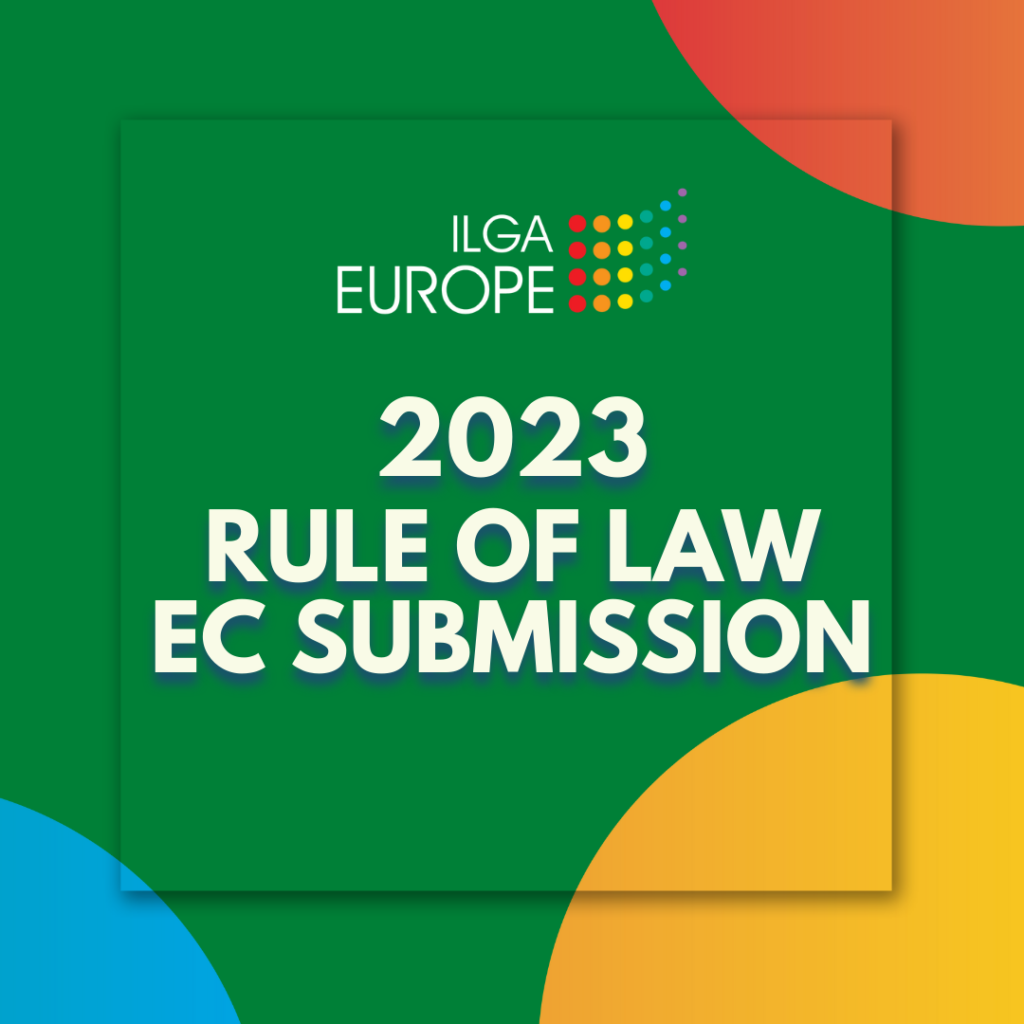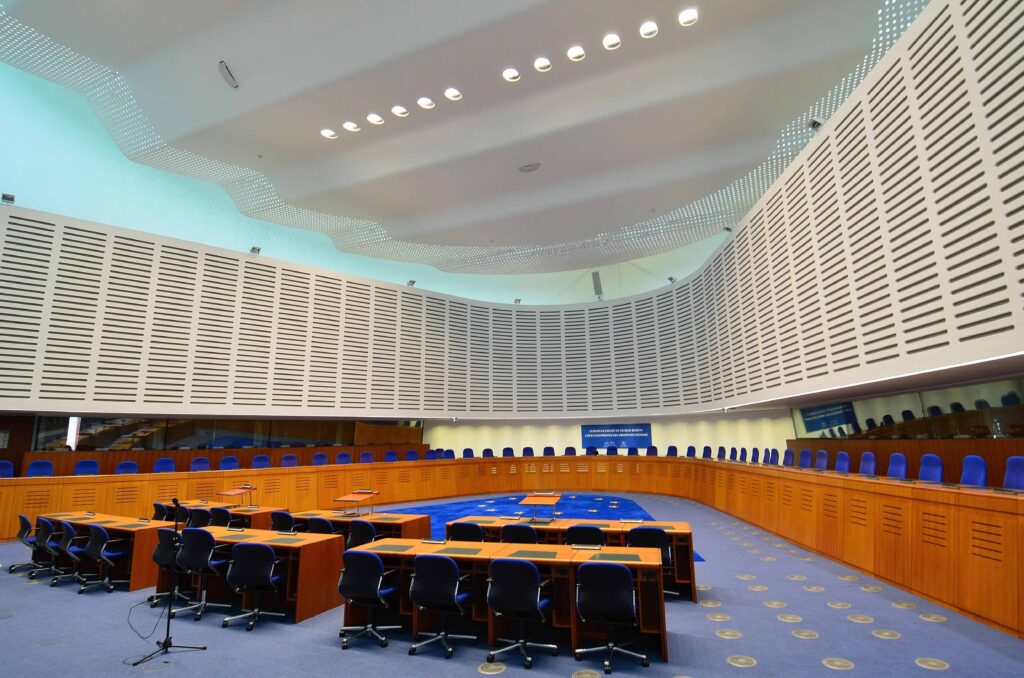Germany
Categories Score
The full bar chart stands for 100%, and is filled by the country category score. The colour display uses the traffic light palette, with Green representing a score closer to 100% and Red a score closer to 0%.
ASYLUM
This category looks into laws that expressly include SOGISC as a qualification criteria for seeking asylum. We also take into account other legislation, policies, instruction or positive measures by state actors that are related to asylum addressing the needs and rights of LGBTI asylum seekers and refugees.
Criteria Compliance Ratio
Each pie charts stands for a category and is divided in slices by criteria. When a country complies with a criteria – fully or in some regions – the slice is coloured.
Keep in mind the criteria have different weighting factor within a category; for example, the criteria Prohibition of medical intervention without informed consent (intersex) stands for half (2.5%) of the INTERSEX BODILY INTEGRITY category weighting factor (5%). Meaning that even if a country can only comply with this specific criteria within the category (1/4 total criteria) the category scores 50%.
More information on the categories and criteria weighting factors here.
Category & Criteria Table
The table lists detailed information and insights on legislation supporting each criterion status. Please use the filters for in-depth analysis.
n/a = not applicable, meaning the criteria didn’t exist in the previous Rainbow Map edition (PROGRESSION column)
- Complies
- Applicable in some regions only
- Does not Comply
RECOMMENDATIONS
In order to improve the legal and policy situation of LGBTI people in Germany, ILGA-Europe recommend
- Recognising trans parenthood, recognition of parents’ legal gender and alignment with available gender options.
- Introducing hate speech laws that explicitly cover all bias-motivated speech based on sexual orientation, gender identity and gender expression and sex characteristics (SOGIESC).
- Introducing laws on asylum that contain express mention of all SOGIESC (sexual orientation, gender identity, gender expression, sex characteristics) grounds.
- Allowing for automatic co-parent recognition for all couples, so that children born to couples, regardless of the partners’ sexual orientation and/or gender identity, do not face any barriers in order to be recognised legally from birth to their parents.
Annual Review of Germany
In our Annual Review of the Human Rights Situation of LGBTI People in Europe and Central Asia, we examine the advances made and provide concrete examples of on-the-ground situations at national level country-by-country in the 12 months from January to December 2024.
Read our Annual Review of Germany below for more details and stories behind the Rainbow Map. You can also download the Annual Review chapter (.pdf) covering Germany.
-
In March, the Federal Government released its fourth biennial report assessing whether countries listed as “safe” for return by the Bundestag still meet safety criteria. Even with deteriorating conditions for LGBTI people in Ghana, Senegal, and Georgia, these countries remain classified as safe, despite escalating violence and discrimination.
In July, a gay Iraqi was deported to the persecuting state due to procedural errors.
Since August, German civil society organisations have been advocating for a continuation beyond the expected end date of the Reception Program Afghanistan which, since its launch in October 2022, helped rescue thousands of vulnerable Afghans, among them LGBTI Afghans, from Taliban rule.
In September, the right to asylum became a primary target of a policy framework increasingly undermining fundamental human rights. Germany announced plans to extend border controls to all its land borders, initially for six months. The measures include detaining asylum seekers at borders while assessing whether Germany is responsible for processing their cases, using tools like the Eurodac fingerprint database.
Since November, LGBTI refugees from Uganda, including those facing the threat of the death penalty for their sexuality, have been increasingly rejected by German authorities. In one of these cases, a 27-year-old fled Uganda after facing severe persecution, including threats to his life, family, and even being shot. However, BAMF rejected his asylum application, deeming his sexual orientation not credible.
-
In December, the sedition trial against a preacher from the “Baptistenkirche Zuverlässiges Wort Pforzheim” (BKZW) group moved to the next stage at the regional court, with the accused appealing the judgment of the Pforzheim District Court. In June 2023, the preacher had made controversial statements during a sermon, which was also shared online, claiming that LGBTI people should be “destroyed by the state” and that they were dangerous. These statements were deemed an attack on human dignity by the Pforzheim District Court, which imposed a fine of 150 daily rates at 40 euros each, resulting in a criminal record for the 32-year-old preacher.
-
In April, two bias-motivated attacks were recorded against Afghan trans women. The first incident involved a perpetrator spraying pepper spray in the victim’s face after hurling insults. A week later, four attackers targeted a group of six trans women, beating and kicking them. In both instances the police responded swiftly, quickly identifying and arresting the perpetrators.
In May, the Ministry of Interior released its yearly report on politically motivated crimes, underscoring an increase in the recorded number of crimes motivated by the victims’ perceived sexual orientation and/or gender identity and expression.
Between June and September 2024, the Centre for Monitoring, Analysis and Strategy (CeMAS) documented a surge in extremist mobilisations against Pride and Christopher Street Day events across 27 German cities, involving violence and intimidation. The Federal Ministry of the Interior reported 22 protests during this period.
-
Since April, discussions have centred on “gender bans” that explicitly prohibit the use of gender-sensitive language at universities and public authorities in various federal states, including Bavaria, Hesse, Saxony, and Saxony-Anhalt.
Nonetheless, in May, a report by the Federal Anti-Discrimination Office (ADS) underscored that under these provisions there is a notable risk that institutions may contravene the prohibition of gender discrimination and infringe upon general personal rights of women, intersex people, and non-binary people. Throughout the year, several states, including Bavaria, Hesse, Saxony, and Saxony-Anhalt, have implemented or announced bans on the use of gender-inclusive language in multiple areas. After protests erupted at various universities, the Ministry of Science clarified that the ban would apply only to specific university functions on the basis of the alleged necessity of preserving the capacities of people with learning disabilities or with German as a foreign language.
-
Germany continues to block the adoption of the EU anti- discrimination directive, despite the federal government’s coalition agreement promising a reform of the national anti- discrimination law.
In May, “Just now. For all,” a campaign of about 200 non-profit organisations advocating for the preservation of funding for civil society initiatives, appealed to Chancellor Olaf Scholz with a petition to review the 2025 federal budget and the austerity measures proposed by the Ministry of Finance.
The campaign underscored that budget cuts would endanger civil society projects and initiatives throughout the country, causing serious implications on democracy promotion, child and youth services, political education, and voluntary programs.
In December, the Federal Government presented a report on the progress of the 2022 “Queer Living” Action Plan’s implementation. The report revealed that nearly two-thirds of the 134 proposed measures have already been implemented or are in progress. Civil society organisations have expressed their disappointment that key initiatives such as the inclusion of a ban on discrimination based on sexual identity into common law have not been implemented. They also criticised the lack of adequate funding for several measures and called on future governments to prioritize the action plan and fulfill outstanding reform promises.
-
In January, the then Federal Minister of Justice Buschmann presented key points for a reform of the right of descent, aiming to improve rights for LGBTI families by abolishing stepchild adoptions for two-mother families and introducing parenting agreements. Until September, no draft was made available. In October, a draft was discussed with the Ministries of Justice of the federal states. Following the coalition split in early November, no further steps will be taken on the current measures and legislative reform will now be postponed and addressed in the next legislative period.
In October, Germany’s Federal Justice Minister Marco Buschmann of the Free Democrats (FDP) announced new plans to reform adoption and family law. The proposed reforms aim to allow adults in unmarried partnerships to adopt a child together and permit just one adult in a marriage to legally adopt a child, addressing gaps in current laws. Currently, both married and unmarried heterosexual and same-sex couples can adopt, but married couples must both legally adopt the child, while only one adult in an unmarried partnership can do so. The proposed reform would allow a more flexible approach, aligning the law with the realities of family life today. No proposal was presented by the time the government coalition broke up in November.
-
Starting in August, far-right groups and neo-Nazis began organising so-called counter-demonstrations in response to local Pride marches, with participation varying between 30 and 600 people. The police responses varied significantly, ranging from protecting the Pride marches from counter-protests, to underestimating the threat and failing to provide adequate security. As a result, incidents of hate crimes near Pride marches surged dramatically. For instance, in the period from June to September, the Centre for Monitoring, Analysis and Strategy (CeMAS) recorded right-wing mobilizations against Pride in 27 cities nationwide, some of which included attempted attacks and violence.
-
In March, the Federal Social Court released a written statement for its judgement in case B 1 KR 16/22 R, delivered on October 19, 2023. The ruling restricts the assumption of costs for people wishing to start their medical transition and reduces access to trans-healthcare for non-binary people. In practice, if a person is open about their non-binary identity to the insurance company, the insurance company can, and often will decline to cover the costs.
Three years after the Conversion Treatment Protection Act came into force, conversion therapies are still present across the country. Although the governing parties have recognised the urgent need for reform and promised an amendment in the coalition agreement, the responsible ministries seem to have shelved these measures in this legislative period.
In September, a hearing was held in the Bundestag on the rights of sex workers as part of the efforts of some politicians who are pushing for the introduction of a Nordic model in Germany, which would decrease sex workers’ health and safety.
-
In June, the Bundestag passed a law aimed at further developing international criminal law during its second and third readings. This legislation establishes a legal framework for prosecuting international law crimes against lesbian, gay, bisexual, trans, intersex, and other queer people, empowering the courts to prosecute crimes committed against individuals based on their sexual orientation as violations of international law. Furthermore, the accompanying explanatory memorandum states that bias- motivated violence on grounds of gender identity, specifically those directed at trans and intersex people, can be classified and prosecuted as gender-based crimes.
-
In January, ZDF, a German public-service television broadcaster, aired a documentary on the persecution of LGBTI people under the Nazi rule.
In September, Olaf Scholz became the first chancellor in German history to give a speech on the rights of LGBTI people, opening a queer human rights conference of his own party, SPD.
-
In April, the Bundestag passed the Self-Determination Act, allowing trans, intersex, and non-binary people to update their gender marker through a simple declaration at the registry office, based on self-determination. This new law replaces the Transsexual Act (TSG), which had been criticised for being unconstitutional and requiring lengthy, costly, and demeaning court and medical procedures for gender recognition. Self- determination for people without legal status was not included in the legal frame. In May, following the rejection of a motion appealing to the Conciliation Committee, the law was approved also at the Federal Chamber. On November 1st the law came into effect, formalising a process according to which trans, intersex, and nonbinary people aged 18 and older can alter their records by making a personal declaration, with only a three-month waiting period required. Minors over the age of 14 can also change their gender marker with parental approval or legal recourse, while younger children can have their parents act on their behalf, though the child must be present to provide their assent if they are older than five years old.
-
In April, an expert commission established by the government presented its final report evaluating the potential legalisation of egg donation and surrogacy. The commission concluded that the legalisation of egg donation is generally permissible; however, it expressed greater caution regarding the legalisation of surrogacy. Additionally, the commission recommended the complete decriminalisation of abortion.
In November, a law which imposes fines for harassment outside abortion clinics, medical offices, and counselling centres, came into force.
-
The IPSOS Pride Study 2024 revealed that 73% of Germans believe LGBTI couples should have the same rights as heterosexual couples when it comes to adopting children, marking a four percentage point increase from three years ago. The report underscored that Germany, along with France and Poland, has seen a slight positive shift in the acceptance of LGBTI identities in recent years, but only 47% of respondents support laws prohibiting discrimination against LGBTI people, a 3% decrease from 2021.
The full Annual Review for 2025 is available here.








